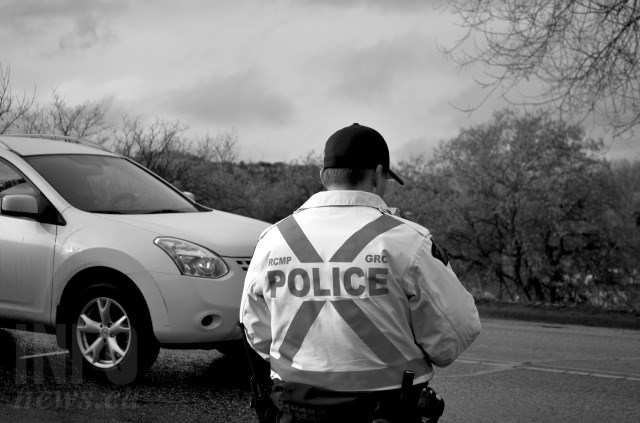
FILE PHOTO
(CHARLOTTE HELSTON / iNFOnews.ca)
November 30, 2016 - 4:30 PM
'SOMEONE IS GOING TO GET INJURED HERE'
VERNON - As police officers assemble for the watch at the Vernon RCMP detachment, they look around to see who’s got their back for the next 12-hour shift.
It’s no minor concern. We all rely on police to save us from dangerous situations, but who comes running for police when they are in danger? Not long ago, a Vernon RCMP officer could expect seven to nine other officers on their watch ready to roll for an emergency, but not anymore.
Sources tell iNFOnews.ca sometimes it's four or three. Other times, just two other officers are on the street to back them up.
They do the only thing they can do: 'Risk it out.’
That’s become a common refrain inside the RCMP as they head out onto the streets to serve and protect a population nearing 40,000 people. And it’s putting officers in danger, sources say.
At any given time, a number of the detachment's officers are on leave for injury, illness or administrative leave. The Vernon detachment is authorized to have 56 positions, although it only has funding from the city for 50 officers and must budget accordingly. Due to roughly nine of 57 established officers currently on leave (roughly 15.7 per cent of the workforce), there are 48 roadable, operational officers. To make up the difference, ‘road-able’ officers — those capable of responding — often work overtime to cover shifts, adding work and family stress to difficult situations. But they can't always be relied upon to show up on their time off, forcing watches to make do with what they have. And while the situation reaches crisis levels in Vernon, our investigation shows it’s part of a greater problem within RCMP detachments across the country.
“YOU CAN GET SPREAD THIN REALLY FAST”
Dennis Connelly is a retired cop of 25 years who, when interviewed at a Vernon coffee shop, still picks a seat facing the room so he can see everyone. Much of his career was spent in Ontario and the Yukon, but he served as a general duty member in Vernon for a short spell before retiring here in 2012.
He remembers shift minimums being roughly ten officers to a watch back in his day; one sergeant, one corporal, and roughly eight constables on the road. And you needed each and every one, he says.
“You’ve got an accident on one end of the detachment area, you get a fire at the other end, you get some alarms going off at downtown stores, and then you get a domestic over at someone’s house,” Connelly says. “It’s happened where you have two domestics at two different areas. Well, there’s four of your eight. Add a motor vehicle accident, you’ve got two more. Then you’re running two people watching the rest of the City of Vernon. You can get spread thin really fast.”
And each one of those calls can carry unexpected risks; domestic disputes are notoriously dangerous, as are traffic incidents. Three years ago, in Kamloops, RCMP Const. Jean-Rene Michaud made a routine traffic stop at 2 a.m. when the subject pulled a gun and shot him six times.
The challenge comes when RCMP officers take maternity leave, paternity leave, sick leave, are suspended, away for training or off due to injuries. While other employers, including private city police forces, are compelled to make up for lost resources in the name of safety, the RCMP doesn’t. And it is creating an escalating cascade of new problems putting officers at risk and leaving crimes unattended.
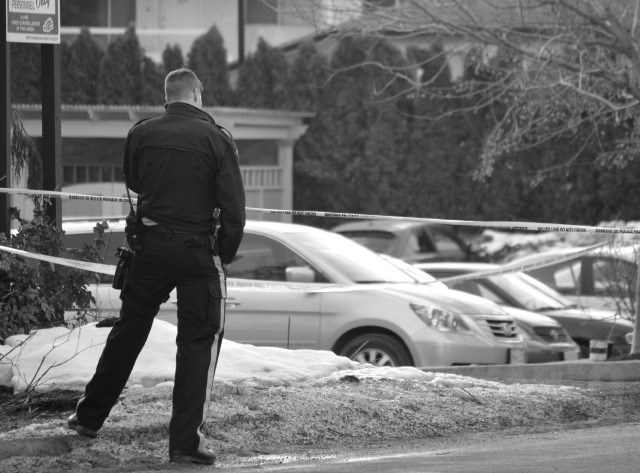
FILE PHOTO
(CHARLOTTE HELSTON / iNFOnews.ca)
Members who are on leave still get paid and count as established positions — technically they even remain named to watches — but Connelly says the positions are not filled until the officer returns.
“In the grand scheme of things, those people are still on your watch. If someone asks ‘is your watch full?’ the answer’s yes, but it’s not,” Connelly says. “They’re still on your watch, but they’re not there for a year. They’re not replaced.”
Instead, watches that are short due to soft vacancies are typically filled on over time by remaining officers.
“Extra money is always a good thing, but when it continues on for long, extended periods of time, it gets to be you want your own time off,” Connelly says.
He’s seen officers become so overworked that calling in sick or taking stress leave is used as an escape. That in turn puts even more pressure on the officers who do show up.
“Stress becomes an issue. You feel obliged to come in, but it just impacts your life,” he says. “It kills morale.”
Each officer is responsible for a caseload of files, and Vernon has one of the highest officer caseloads in the province, according to the Ministry of Justice. In a comparison of municipalities with populations over 15,000 from 2014, officers in Vernon had a caseload of 84, second only to Fort St. John, which had 91. When officers are on leave, not only do watches run short, cops also have to take on extra case files.
Contrast the RCMP approach to Port Moody, which has an independently run police service overseeing a population just slightly below Vernon’s, where the detachment’s 51 members carry a caseload of just 20 files each. According to a spokesperson for the Port Moody Police Department, watches have a maximum strength of six and an enforced minimum of four officers. That's in a city with one-third the patrollable area and 6,000 fewer residents.
Connelly, who worked as an RCMP recruiter, believes staffing issues can in large part be traced back to a shortage of officers country-wide, and the loss of candidates to independent police forces.
“I think the allure of the red serge of the RCMP doesn’t have the same impact anymore. People don’t want to work in small communities, they don’t want to get transferred and moved all over the place,” he says. “Unless things have changed from when I retired, we fall further and further behind every year.”
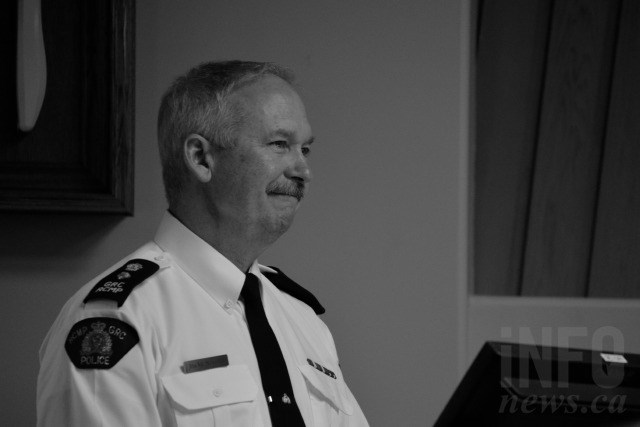
Supt. Jim McNamara. (File Photo)
(CHARLOTTE HELSTON / iNFOnews.ca)
Operations at the Vernon detachment are not an open book and we did not receive any specific information about staffing levels from Supt. Jim McNamara, the officer in charge. He would not publicly provide the total number of general duty positions, nor the number of officers on a watch, due to operational and officer safety reasons, but when asked if things have changed since 2014, when former Supt. Reg Burgess reported difficulty maintaining 48 operational members due to eight to ten members being on medical or administrative status, McNamara acknowledged the numbers remain consistent with previous years.
MAYOR NOT CONCERNED
The city authorizes funding for each officer position within its municipal bounds, but Vernon Mayor Akbal Mund admits he knows little about what the city gets for its money.
“All we know is there’s a certain amount they ask for that we pay for…. That’s about the number we get, and that’s all we know, because how they staff and all that, we don’t get involved in that as politicians,” Mund says.
He could not say exactly how many positions are currently filled, or how many officers are expected, at minimum, on watches.
He says the detachment has not asked the city for an increase in funding since 2015, and he has not personally heard of any staffing related issues.
“I’ve heard nothing. Nope, nothing,” Mund says.
There’s likely a good reason for that. Officers who speak publicly can be fired and perhaps lose their careers in RCMP Code of Conduct hearings for speaking out publicly about the dangers they face.
When advised that staffing concerns had been expressed to iNFOnews.ca, Mund said he couldn’t comment without knowing where the information came from.
“I can’t say I’m concerned because people can say anything,” he says. “I don’t know where the information came from.”
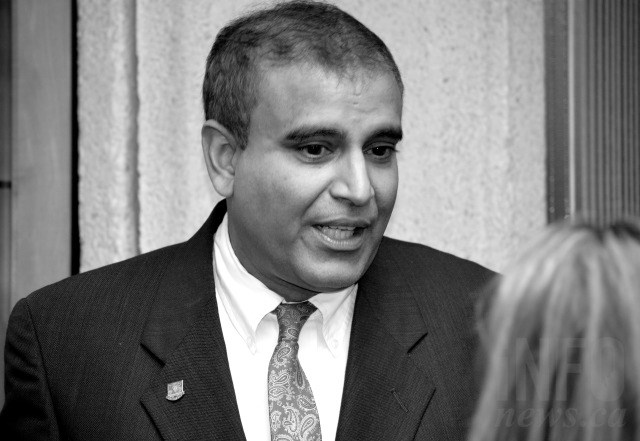
Mayor Akbal Mund (FILE PHOTO)
(CHARLOTTE HELSTON / iNFOnews.ca)
Officially, the Vernon detachment has approval for 50 officers to cover the City of Vernon specifically, though two positions have remained unfilled since last year, meaning the city is paying for 48 officers.
The city’s chief administrative officer Will Pearce confirmed the city provides funding for 50 officers, but said that number is rarely if ever billed for due to challenges with vacancies.
“In the RCMP, from the nature of the job, there is quite a combination, some turnover (with) officers moving to other roles or detachments for promotions, plus all the usual stuff, maternity, paternity leave, sick leave…. That’s all fairly active in the RCMP,” Pearce says.
According to a report by the Ministry of Justice released in 2015, the latest figures available, authorized staffing levels at the detachment sharply decreased by nine members from 2009 to 2014.
“I do know there was a run up in the number of positions and authorized strengths due to a lot of activity — negative activity,” Pearce says of the greater number of positions authorized in 2009. “Council of the day said we’re going to put more officers on the streets.”
In addition to the regular bill for 48 members, the city also paid $331,487 in over time costs from April 2015 to March 2016 but neither the city nor McNamara could be specific about how that money was spent or why.
RCMP CHRONICALLY UNDERSTAFFED
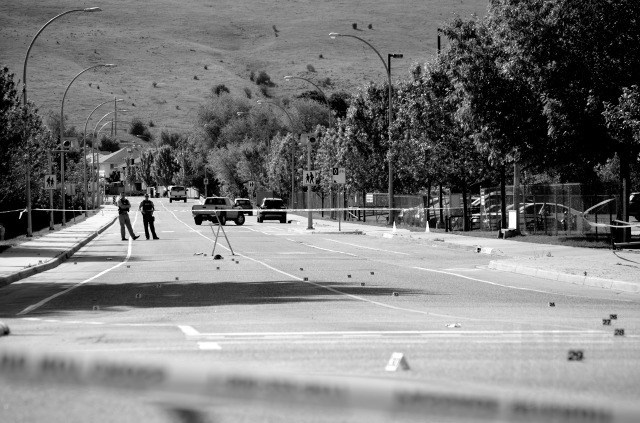
File Photo
(CHARLOTTE HELSTON / iNFOnews.ca)
Rob Creasser, a retired Mountie from Kamloops and spokesperson for the Mounted Police Professional Association of Canada, says staffing levels and officer safety are a concern across the country, not just in Vernon.
“Right now, the RCMP, we believe, is so critically under-resourced it’s causing all kinds of other issues,” Creasser says.
Detachments set minimum staffing levels for watches, but Creasser says they are not enforceable. In non-RCMP forces, Labour Codes and unions can help enforce staffing levels for officer safety. The RCMP has no union.
Instead, Creasser says, RCMP watch commanders try to meet minimums, but are often forced to ‘risk it out’ when they can’t get enough people to cover the shift. That’s cutting it close for officer safety, he says, and it’s not theoretical. The RCMP was charged with four counts related to equipment, training and supervision under the Canada Labour Code following the fatal shootings of three officers in Moncton, NB in 2014.
“There is no mathematical formula you can apply to say it’s going to be slow tonight, or we can afford to not bring in enough people….” Creasser says. “You should have minimum manpower allotted and (it) should be enforced.”
Another source, who cannot be named, put it more bluntly.
“They (officers) are not getting the support they used to,” the source says. “It is a huge safety issue. I think someone is going to get injured here.”
— This story was corrected at 9 a.m. Dec. 3, 2016 to say 15.7 per cent of the Vernon detachment’s officers are away on leave, leaving it with 48 roadable members. An earlier version of this story stated 20 per cent were off the job, leaving an estimated 38 to 40 roadable members.
To contact a reporter for this story, email Charlotte Helston or call 250-309-5230 or email the editor. You can also submit photos, videos or news tips to the newsroom and be entered to win a monthly prize draw.
We welcome your comments and opinions on our stories but play nice. We won't censor or delete comments unless they contain off-topic statements or links, unnecessary vulgarity, false facts, spam or obviously fake profiles. If you have any concerns about what you see in comments, email the editor in the link above.
News from © iNFOnews, 2016